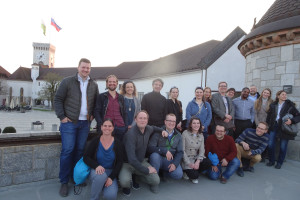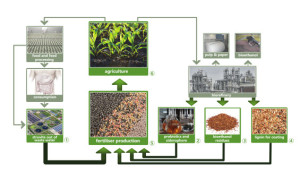SUSFERTs highly sustainable bio-based fertilisers will replace conventional products, which are depending heavily on imported rock phosphate, and will valorise waste and by-products of several industries to strengthen the European circular economy.
To meet the ever-rising demand for food and feed, the European agriculture currently still depends heavily on the use of non-renewable, resource-intense fertilisers. Their major fertiliser component phosphorus is considered a critical resource: it is mined and 90 percent are imported into the EU. On top of that, the agricultural sector has to deal with a huge loss of nutrients from conventional fertilisers because a major part of the nutrients applied as fertilisers are often not available at the right amounts and at the right time to optimise plant growth. They get bound in the soil or are leached out into the ground water because timing and dosage are unsuitable for plants.

Innovative SUSFERT fertilisers
Innovative fertilisers developed by the SUSFERT project will be part of several approaches to contribute to a circular bioeconomy (Fig. 2): Imported non-renewable phosphorus (P) will be reduced by partial substitution with struvite, a P-rich product from wastewater treatment (1), and through the use of bacteria (probiotics) for solubilising P unavailable to plants. Two parallel solutions will be advanced for replacement of synthetic chelates for iron fertilisation. On the one hand, probiotics solubilising iron and, on the other hand, direct application of siderophores produced by yeast in fermentations (2). Organic fertilisers based for example on residues from bioethanol production will be improved with siderophores (3). Synthetic coating polymers will be replaced by enzymatically modified lignosulfonates to produce bio-based, bio-degradable coatings (anti-dust, anti-caking, controlled release) (4). Improved fertiliser solutions will fit into existing production lines and application procedures (5). Production on a large scale will be demonstrated and field trials run in various countries over three years (6).

Aims and impacts for EU agriculture
The SUSFERT project is expected to achieve several ground-breaking results and produce innovative products. Major expected impacts of SUSFERT are to disrupt the EU dependency on non-renewable mined phosphate rock and decrease it by up to 40%. Another aim of this project is the replacement of synthetic chelates as well as synthetic fertiliser coatings by bio-degradable SUSFERT alternatives in the long run. Moreover, a reduction of soil and water contamination is expected by developing at least four novel fertiliser products which enable exact nutrient delivery for major crop plants, resulting in lower environmental impact.
The SUSFERT products will be evaluated regarding economic potential, environmental sustainability, regulatory compliance and industry-scale production processes and their market-driven development will ensure a quick uptake in organic and conventional agriculture. The circular economy is strengthened by valorising waste and by-products from wastewater treatment, bioethanol production and the pulp & paper industry (see Fig. 2). This will also boost rural areas by establishing local value chains and regional possibilities for feedstock sourcing.
About SUSFERT project
The project “Sustainable multifunctional fertiliser – combining bio-coatings, probiotics and struvite for phosphorus and iron supply” (SUSFERT) started on May 1st 2018 and will run for a duration of five years. With a budget of € 9.4 Million it receives € 6.6 Million public funding from the Bio-Based Industries Joint Undertaking (BBI-JU) under grant agreement No. 792021. The BBI-JU receives support from the European Union’s Horizon 2020 research and innovation programme and the Bio-Based Industries Consortium.
Find more information on the project on our project website and on its factsheets and other dissemination material available online. Get the latest news by subscribing to the SUSFERT Newsletter and by following us on Twitter and LinkedIn.
Text by Natascha Miljković (RTDS, www.rtds-group.com)


